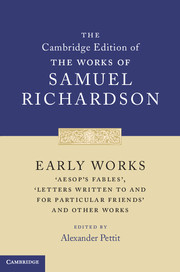Book contents
- Frontmatter
- Dedication
- Contents
- General Editors’ Preface
- Acknowledgements
- Chronology
- List of Abbreviations
- General Introduction
- Textual Introduction
- The Apprentice’s Vade Mecum (1733)
- A Seasonable Examination of the Pleas and Pretensions (1735)
- Preface to Aubin, A Collection of Entertaining Histories and Novels (1739)
- Aesop’s Fables (1739)
- Letters Written to and for Particular Friends (1741)
- Six Original Letters Upon Duelling (1765)
- Appendix: The Infidel Convicted (1731)
- Postscript
- Emendations
- Word-division
- Bibliographical Descriptions of Early Editions
- Explanatory Notes
- Index
Letter LXXIX
Published online by Cambridge University Press: 30 June 2022
- Frontmatter
- Dedication
- Contents
- General Editors’ Preface
- Acknowledgements
- Chronology
- List of Abbreviations
- General Introduction
- Textual Introduction
- The Apprentice’s Vade Mecum (1733)
- A Seasonable Examination of the Pleas and Pretensions (1735)
- Preface to Aubin, A Collection of Entertaining Histories and Novels (1739)
- Aesop’s Fables (1739)
- Letters Written to and for Particular Friends (1741)
- Six Original Letters Upon Duelling (1765)
- Appendix: The Infidel Convicted (1731)
- Postscript
- Emendations
- Word-division
- Bibliographical Descriptions of Early Editions
- Explanatory Notes
- Index
Summary
A Gentleman to a Lady, professing an Aversion to the tedious Forms of Courtship.
Dear Madam,
I Remember that one of the Ancients, in describing a Youth in Love, says he has neither Wisdom enough to speak, nor to hold his Tongue. If this be a just Description, the Sincerity of my Passion will admit of no Dispute: And whenever, in your Company, I behave like a Fool, forget not that you are answerable for my Incapacity. Having made bold to declare thus much, I must presume to say, that a favourable Reception of this will, I am certain, make me more worthy your Notice; but your Disdain would be what I believe myself incapable ever to surmount. To try by idle Fallacies, and airy Compliments, to prevail on your Judgment, is a Folly for any Man to attempt who knows you. No, Madam, your good Sense and Endowments have raised you far above the Necessity of practising the mean Artifices which prevail upon the less deserving of your Sex: You are not to be so lightly deceived; and if you were, give me leave to say, I should not think you deserving of the Trouble that would attend such an Attempt.
This, I must own, is no fashionable Letter from one who, I am sure, loves up to the greatest Hero of Romance: But as I would hope that the Happiness I sue for, should be lasting, it is certainly most eligible to take no Step to procure it but what will bear Reflection; for I should be happy to see you mine, when we have both out-lived the Taste for every thing that has not Virtue and Reason to support it. I am, Madam, notwithstanding this unpolish’d Address,
Your most respectful Admirer, and obedient Servant.
- Type
- Chapter
- Information
- Early Works'Aesop's Fables', 'Letters Written to and for Particular Friends' and Other Works, pp. 412 - 413Publisher: Cambridge University PressPrint publication year: 2011

